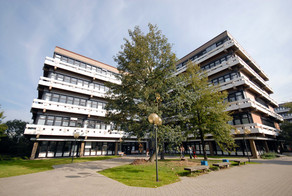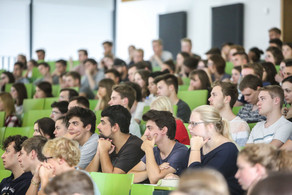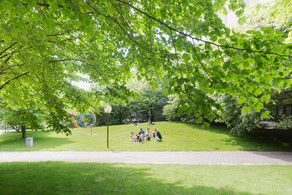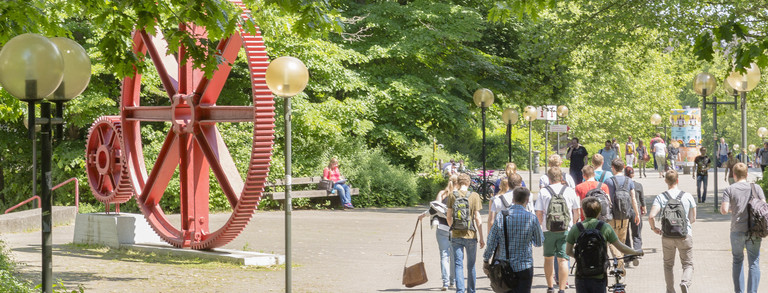Research projects
MindOut - Promoting Social and Emotional Well-Being. A program for middle and high school students in secondary schools
Promoting young people's social and emotional well-being is an important factor in their development, enabling them to achieve positive long-term outcomes in school, work, and life in general. MindOut aims to fill this gap by offering secondary schools a skills-based program to promote the social and emotional well-being of young people aged 15 to 18 years old
Contact person (scientific management): Prof. Dr. Ricarda Steinmayr
Contact person(scientific assistance): M.Sc. Victoria Sophie Listing
To the project website
GLÜCK: Well-being in adolescence
The project, which is funded by the Mercator Research Center Ruhr, investigates how the subjective well-being of young people changes and which factors explain individual differences in these changes.
Contact persons: Prof. Dr. Ricarda Steinmayr and M.Sc. Miriam Schmitz
FederleichtLernen: Learning support in augmented reality with the aid of an intelligent sensor pen Subproject: Motivated learning from mistakes
The basis of the planned project is the augmented reality learning environment, which uses a sensor pen to record data about the learning situation (e.g. pen movement, physical and physiological parameters).
Contact persons: Prof. Dr. Ricarda Steinmayr
MopeD - Motivational and personality-related determinants of intellectual development in primary school age.
MopeD, a research project supported by the German Research Foundation (DFG), investigates the reciprocal influence of personality traits, more precisely of investment traits and intelligence development of primary school children.
Contact persons: Jun.-Prof. Dr. Sebastian Bergold and Prof. Dr. Ricarda Steinmayr
Study on the quality of distance education ("homeschooling")
This project focuses on the current situation and on the quality of homeschooling in Germany. More information about this project can be found on the project website.
Contact persons: Prof. Dr. Ricarda Steinmayr
Motivation development
Highly motivated students should be more successful in school than their less motivated peers, as high motivation to learn is associated, for example, with curiosity, greater engagement, and higher persistence in completing school tasks. A frequently replicated finding from studies on the development of school learning and achievement motivation is that it develops unfavorably over the school years. This project sheds light on various aspects of the development of motivation in students.
Contact persons: Dr. Anne Franziska Weidinger (no longer at TU Dortmund) and Prof. Dr. Ricarda Steinmayr
Test fairness regarding gender
Gender differences in cognitive abilities are among the most discussed and researched topics in differential psychology. Especially when performance tests are the basis for important decisions in practice - for example in personnel selection - gender-fair measurement is essential. Find more information about this project on the project website.
Contact persons: Jun.-Prof. Dr. Sebastian Bergold and Prof. Dr. Ricarda Steinmayr
Cognitive development at school age
Cognitive development is a highly relevant topic at the interface between developmental psychology and educational psychology. At our chair, we investigate school-related and individual determinants of cognitive development at school age. As school-related determinants we investigate the duration of schooling and the quality of schooling; with regard to individual determinants we examine in particular investment traits.
Contact persons: Jun.-Prof. Dr. Sebastian Bergold and Prof. Dr. Ricarda Steinmayr
Intellectual giftedness
A current and important topic in educational psychology is intellectual giftedness. More information about this project and the coherent research on intellectual giftedness at TU Dortmund University can be found at the project website.
Contact persons: Dr. Linda Wirthwein, Jun.-Prof. Dr. Sebastian Bergold and Prof. Dr. Ricarda Steinmayr
Pedagogical-psychological knowledge of teachers about diversity in the context of school inclusion
Pedagogical-psychological knowledge of teachers includes knowledge about learners, learning and teaching, which is independent of the subject or field of education (Voss, Kunina-Habenicht, Hoehne & Kunter, 2015). It is a component of teachers' professional competence and is associated with, among other things, higher teaching quality and lower burnout symptoms. There are already several test procedures available for assessing pedagogical-psychological knowledge, which differ significantly in terms of content focus as well as length and the test material used (for a current overview, see Voss et al., 2015).
Contact persons: Lisa Tometten M. Sc. (no longer at TU Dortmund), Dr. Anke Heyder (no longer at TU Dortmund) and Prof. Dr. Ricarda Steinmayr
Target orientations
The goal-directedness of human behavior has been a relevant research topic since the beginning of psychology. Target orientations are the motivational focus of individuals in learning and performance contexts. Further information on this project and the coherent research on target orientations at TU Dortmund University can be found on the project website.
Contact persons: Dr. Linda Wirthwein and Prof. Dr. Ricarda Steinmayr
COMPARE-school: school success, psychosocial adjustment, and subjective well-being
COMPARE-school is part of the joint project COMPARE (Children of mentally ill parents at risk evaluation), which deals with the effects of parental mental illness on their children. Children of mentally ill parents not only have an increased risk of becoming mentally ill themselves, but they may also exhibit abnormalities in other areas (e.g., emotional or social skills).
Contact persons (scientific management): Dr. Linda Wirthwein and Prof. Dr. Ricarda Steinmayr
Contact persons (research assistants): Helene Eckert
Funded by: Federal Ministry of Education and Research
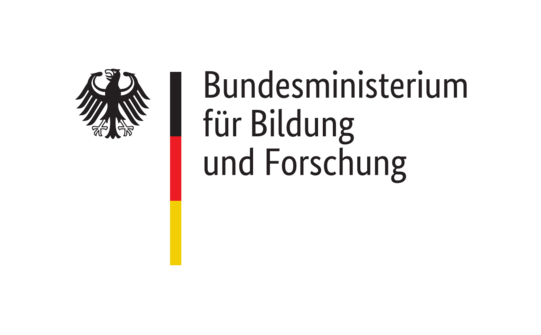

Experimentation in psychology classes
In the context of several courses we are currently dealing with (digital) experimentation in psychology classes. Experiments are used both deductively and inductively. Experimentation is intended to promote the direct experience of the students. Psychological phenomena can thus be directly integrated into the lessons, thus increasing the motivation of the students. We cooperate with several schools to carry out these experiments. If you are interested in a cooperation, please contact Dr. Linda Wirthwein (linda.wirthwein@tu-dortmund.de).
Contact persons: Dr. Linda Wirthwein

